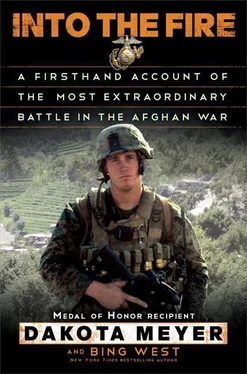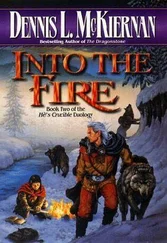“We may need backup,” he said. “But if I ask over there”—he pointed toward his op center—“I’ll be ordered not to go. So be ready to roll early if you want in on the action.”
Sgt. Jeffords was known for being the crazy one on base when it came to fighting the enemy. Guys always talked about the time he walked up Dab Valley with a big bright orange air panel—made to mark your position for aircraft—on his back as a cape trying to get the Taliban to shoot at him. I wanted to do the exact same thing except while getting shot at. I briefed Lt. Johnson on my latest scheme.
“Meyer,” he said. “That is a bullshit idea. You’ll get me in trouble again. Forget about it.”
At six in the morning, Jeffords came up on the radio, and I could hear shooting in the background.
“We’re engaged,” he said. “You coming?”
I shook Lt. Johnson awake. He muttered that Jeffords’ platoon would break contact, as was standard procedure. He rolled over to go back to sleep. I shook him again.
“I don’t think so,” I said. “We gotta get out there, sir—something must be wrong, and you know how long it takes the Army to react.”
I added a little drama to get his wheels spinning. Mumbling, he got dressed. I was like a dog with his owner’s leash in his mouth, demanding his morning walk. I even held open the Humvee door for my groggy lieutenant. Together with two truckloads of excited Askars, we rolled to Hill 1911, where Jeffords had deployed his dismounted platoon. As usual, the dushmen were high up on the ridge, shooting and scooting among huge boulders.
“I can climb up,” I said, “and flank them from the right.”
Jeffords nodded vigorously in agreement, smiling. Lt. Johnson gave me a skeptical look.
“All right, Meyer, do your grunt thing.”
I grabbed six or seven Askars and started climbing. Halfway up, a grenade burst next to me, but the rocky ground deflected its shrapnel. I didn’t think the dushmen were that close. We hit the deck, not able to see them. Over the radio, Lt. Johnson informed me that it wasn’t a dushmen grenade; it was friendly fire. A soldier had fired a 40-millimeter shell, not able to tell us from the dushmen. So this was my chance. I pulled a high-visibility orange air panel from my pack, draped it over my shoulders, and continued climbing.
By the time we reached the top, the dushmen had pulled back to our left. We dared not run single file along the ridge trail, so we stayed where we were. Jeffords’ platoon continued plastering the hillside to our front. The dushmen replied with plunging fire, scattering rock chips in all directions and nicking several soldiers. Fortunately, no one needed a medevac. Within an hour, the dushmen had evaporated, per usual.
My little flanking party, thoroughly exhausted, walked back downhill. Jeffords was pleased with his caper, and his soldiers were all grins. They had fired a few thousand rounds, aired out their cabin fever, and nobody was hit too badly. Lt. Johnson was less than pleased. The whole thing went against standard procedures. And he knew I had been a party to it.
“Meyer,” he said, “I told you this was bullshit. I don’t know how you finagled me into this again.”
Just before the Afghan presidential election in late August of 2009, Lt. Johnson sent Staff Sgt. Kenefick and me, along with some Askars, to guard the polling station at Dangam, a district center on the Pakistan border. President Karzai’s cronies had already rigged the election. Dangam was one of many remote districts guaranteed to deliver more votes than there were voters. What a country!
Staff Sgt. Kenefick and I were still a little standoffish with each other about his by-the-book ways. Maybe the lieutenant was forcing us to work together, or he was exiling me so he could relax for a few days. Dangam had been the patrol area for Lt. Jake Kerr’s platoon. Kerr was the wild-bunch officer at Monti, a loaded pistol who did what he wanted. I heard that at West Point he had played rugby, which is football without a helmet. He had sometimes come to our hooch to borrow, like a cup of sugar, a powerful weapon for one operation or another. Jacked from too many years in the weight room, Kerr tromped around the hills like an angry bear, and his platoon adopted his edgy style.
Early on, his platoon was sent to Dangam to stop the infiltration from Pakistan. Kerr’s soldiers had hiked up to every khol , or small knot of houses, along the road from Monti out to Dangam, to offer jobs to pave the road and build schools. Kerr spread the pay equally among small competing tribes. In turn, the work crews, not wanting to be blown up, pointed out where the IEDs were hidden. In short, Kerr knew how to play the tribal game.
In retaliation, the Taliban sent a raiding party to attack the Dangam district office. Tipped off, Kerr had a machine-gun crew waiting on a nearby hill. Three attackers were killed, and the others retreated back into Pakistan. In appreciation, the local Mushani tribe invited the Americans to a feast, where they welcomed Kerr as a tribal member and gave him the name Zelaware Zelmae, or Brave Son.
Kerr persuaded the local Askars and police to help his platoon build a fort. Once that was hardened, he planned to set up ambushes along the trails leading to Pakistan, a mile farther east. But when a nearby outpost was overrun in May, Army headquarters pulled Kerr’s platoon out of Dangam because it was “too exposed.” The platoon thought headquarters had overreacted.
Staff Sgt. Kenefick and I took fifteen Askars and drove out to Dangam. We settled into Kerr’s old fort on top of a small hill with sheer sides protected by triple rows of barbed wire. The fort was a small patch of flat ground surrounded by a deep trench line, with bunkers at each corner—impossible to assault on foot.
But several hundred meters away on all sides were towering mountains. The dushmen could climb higher than the fort and fire down RPGs. It’s hard to find the highest peak in a country jammed full of mountains. You’d have to go all the way east to Everest if you didn’t want any higher ground around you.
Kerr had compensated by pre-plotting every visible slope, so he could call in artillery fire like calling for a takeout pizza. So I did the same. Before leaving Monti, I plotted a half dozen Kilo Echoes. KEs are pre-calibrated impact points for artillery fire. If we came under attack, I could radio a command like, “Left one hundred meters from KE 3366, fire for effect.” The artillery rounds zoomed the five miles over the mountain to that exact spot. Targeting in mountainous elevations is tricky, but I had sufficient practice during sniper training to feel comfortable.
When we arrived about noon, after a long drive without saying much to each other, Staff Sgt. Kenefick and I assigned two Askars to each bunker. I then took out my binoculars, map, and compass to recheck the Kilo Echoes. I had been doing this for about half an hour when a sheep or goat herder in a bluish man-dress walked into plain sight, about four hundred meters away on a higher hillside. He was waving a walking stick at his invisible sheep, while looking right at me. His cover was so pathetic that I almost waved back at him. Then he ducked behind an outcropping, stuck the barrel of an AK out of the rocks, and fired off four or five rounds.
Staff Sgt. Kenefick was standing outside a bunker about a hundred feet from me.
“Meyer, we’re under attack!” he yelled.
Technically, yes. But the shepherd was shooting without poking his head up to aim. He had one chance in a thousand of hitting us. A second harmless burst followed, the bullets cracking more than ten feet above our heads.
“Call for arty! NOW!” Staff Sgt. Kenefick yelled, holding the radio headset out toward me.
Читать дальше












